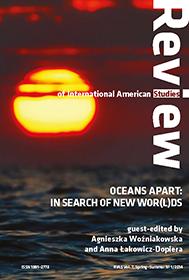The World Wide Sea: Oceanic Metaphors, Concepts of Knowledge and Transnational America in the Information Age
The World Wide Sea: Oceanic Metaphors, Concepts of Knowledge and Transnational America in the Information Age
Author(s): Regina SchoberSubject(s): Social Sciences, Language and Literature Studies, Media studies, Studies of Literature, Communication studies, Comparative Study of Literature, Other Language Literature
Published by: Wydawnictwo Uniwersytetu Śląskiego
Summary/Abstract: ‘I have swam through libraries and sailed through oceans’, Ishmael declares in “Moby Dick”, comparing the accumulation of knowledge to traveling the vast and boundless space of the sea. The ocean has always been related to human curiosity as well as anxiety towards (yet) unknown terrains, reflecting the restless desire to travel, explore, and seek the ‘truth’. As Elizabeth Bishop notes, the sea ‘is like what we imagine knowledge to be, dark, salt, clear, moving, utterly free, drawn from the cold hard mouth of the world, derived from the rocky breasts forever, flowing and drawn’. In view of the massive proliferation of information and knowledge in the digital age, it is thus not surprising that the sea has become one of the leading metaphors for the Internet, the mythical space in which knowledge is stored, generated, and from which it emerges. Whether we navigate or surf on the World Wide Web, whether we immerse in data flows, or participate in swarm intelligence, nautical/sea imagery has been central in conceptualizing the Internet from the beginning on, suggesting notions of openness, infinity, shapelessness as well as creativity, diversity, and fluidity. In my paper I investigate the cultural and ideological functions of sea imagery in relation to new digital information technology, as manifest in American literature and culture, accounting for ascriptions of the Internet as a ‘particularly American technology’. From the creation of the term ‘cyberspace’ (cyber=Greek for steersman) in William Gibson’s “Neuromancer” (1984), to the crowdsourced YouTube film collaboration “Life in a Day” (2011) with its extensive sea imagery to Google’s recent underwater mapping project ‘SeaView’, I seek to unravel the diverse web of connotations, implications, and allusions at play in conceptualizing the Internet in relation to maritime imagery. Against the backdrop of traditional concepts and models of knowledge, I thus intend to explore the heuristic potential and cultural propositions of the sea metaphor in America’s creative engagement and critical negotiation with the new worlds of the ‘Information Age’, taking into consideration its transnational and potentially posthuman future.
Journal: Review of International American Studies
- Issue Year: 7/2014
- Issue No: 1
- Page Range: 9-34
- Page Count: 26
- Language: English

